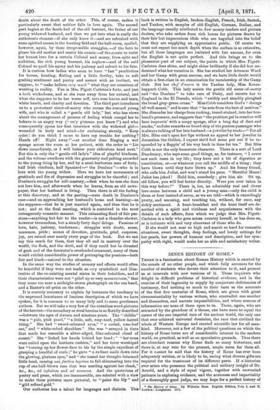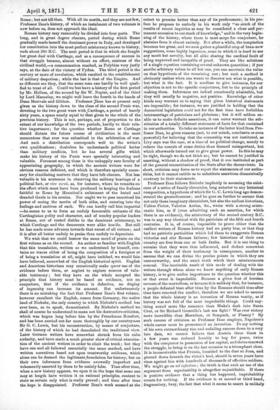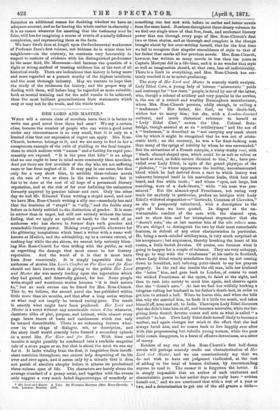IHNE'S HISTORY OF ROME. *
THERE is a fascination about Roman History which is exerted by the annals of no other people, and which fully accounts for the number of students who devote their attention to it, and present us at intervals with new versions of it. Those inquirers who delight in difficult problems of historical evidence, and in the exercise of their ingenuity to supply by conjecture deficiencies of testimony, find nothing so much to their taste as the accounts of the first five centuries of Rome, which are given with great circumstantiality by various writers, who contradict one another and themselves, and narrate impossibilities, and whose sources of information are none of them open to us. Those, again, who are attracted by the grandeur of a theme, can have none to equal the career of the one imperial race of the ancient world, the only one that ever achieved universal dominion, the race that civilized the whole of Western Europe and created scientific law for all man- kind. Moreover, not a few of the political questions on which the history of Rome turns are of considerable interest to the modern world, on practical, as well as on speculative grounds. Thus there are abundant reasons why Rome finds so many historians, and there is, at any rate for the present, ample room for them all. For it cannot be said that the history of Rome has ever been adequately written, or is likely to be, seeing what diverse gifts are required for the treatment of its different parts. If a historian ever arises who possesses the political and military insight of Dr. Arnold, and a style of equal vigour, together with unwearied patience in exploring evidence, and the acuteness and impartiality of a thoroughly good judge, we may hope for a perfect history of
• The History of Rome. By Wilhelm Ihne. English Edition, Vols. L and II. London: Longman. 1871.
Rome ; but not till then. With all its merits, and they are not few, Professor Ihne's history, of which an instalment of two volumes is now before us, does not approach the ideal.
Roman history may reasonably be divided into four parts. The long, and in great degree obscure, period during which Rome gradually made herself the dominant power in Italy, and developed her constitution into the most perfect aristocracy known to history, ends about 280 B.C. The next period is that in which she fought her great duel with Carthage, and as a consequence of success in that struggle became, almost without an effort, mistress of the civilized world,—a consummation reached, as Polybius very justly says, at the date of the victory of Pydna. The third period is the century or more of revolution, which resulted in the establishment of military despotism ; while the last is that of the Empire. And so different are they, that the same man can hardly be well quali- fied to treat of all. Could we but have a history of the first period by Mr. Hallam, of the second by Sir W. Napier, and of the third by Lord Macaulay, we might well leave the fourth in the hands of Dean Merivale and Gibbon. Professor ;Ihne has at present only given us the history down to the close of the second Punic war, devoting to the two great wars with Carthage, a period of barely sixty years, a space nearly equal to that given to the whole of the previous history. This is not, perhaps, out of proportion to the extent of our knowledge of the two periods, hardly to their rela- tive importance ; for the question whether Rome or Carthage should dictate the future course of civilization is the most momentous that ever was submitted to the arbitration of war. And such a distribution corresponds well to the writer's own qualifications ; doubtless he understands political better than military conflicts, but he has several gifts which make his history of the Punic wars specially interesting and valuable. Foremost among these is the unhappily rare faculty of appreciating geography, in which the ancient writers were for obvious reasons deficient, and which is therefore specially neces- sary for elucidating matters that they have left obscure. Not less valuable is his acuteness in observing the military bearings of a political fact, or vice versa, as, for instance, where he remarks on the effect which must have been produced in keeping the Italians faithful to Rome by Hannibal's enlistment of the hated and dreaded Gauls in his armies. Nor ought we to pass unnoticed his power of seeing the merits of both sides, and entering into the feelings and motives of each. We can hardly call him impartial —he seems to us to form an unduly favourable estimate of the Carthaginian polity and character, and of sundry popular leaders at Rome, out of rooted dislike to the dominant aristocracy, to which Carthage and the democrats were alike hostile. But still he has made some advance towards that rarest of all virtues ; and it is after all better unduly to praise than unduly to depreciate.
We wish that we could bestow the same meed of praise on the first volume as on the second. An author so familiar with English that this translation, written as we understand by himself, con- tains no traces either of being the composition of a foreigner or of being a translation at all, might have imbibed, we would fain have believed, somewhat of the English historical spirit. English and American historians may occasionally make queer use of the evidence before them, or neglect to explore sources of valu- able testimony ; but they have on the whole accepted the principle that history must be based on evidence, not on conjecture, that if the evidence is defective, no display of ingenuity can increase its amount. But unfortunately there is no mistaking the fact that Professor Ihne's first volume, however excellent the English, comes from Germany, the native land of Niebuhr, the only country in which Niebuhr's method has ever been, so to speak, domesticated. By Niebuhr's method we shall of course be understood to mean not his destructive criticism, which was begun long before him by the Frenchman Beaufort, and has been carried out tar more thoroughly by our countryman Sir G. C. Lewis, but his reconstruction, by means of conjecture, of the history of which he had demolished the traditional view. Later German writers have somewhat shrunk from his calm audacity, and have made a much greater show of critical examina- tion of the ancient writers in order to elicit the truth ; but they have one and all followed essentially the same method, and have written narratives based not upon trustworthy evidence, which alone can be deemed the legitimate.foundation for history, but on their own inferences from evidence avowedly imperfect and vehemently asserted by them to be mainly false. Time after time, when a new history appears, we open it in the hope that some one may at length have written it on rational principles, content to state as certain only what is really proved ; and time after time the hope is disappointed. Professor Ihne's work seemed at the
outset to promise better than any of its predecessors ; in his pre- face he proposes to embody in his work only "so much of the results of recent inquiries as may be considered a clear and per- manent accession to our stock of knowledge," and in the very begin- ning of the history, where there is most scope for conjecture, he abstains from it almost entirely. But after a while, the temptation becomes too great, and we soon gather a plentiful crop of bran-new suggestions, some highly ingenious, some in which it is hard to see any merit but novelty, but all alike sharing the cardinal fault of being unproved and incapable of proof. They are like solutions of a single equation containing several unknown quantities ; if you ascribe arbitrary values to all but one, you can ascertain the value on that hypothesis of the remaining one ; but such a method is obviously useless when one wants to discover not what is possible, but what is the fact. It is needless to give instances, for our objection is not to the specific conjectures, but to the principle of making them. Inferences are indeed occasionally admissible, but they will usually be negative, not positive. Knowledge of other kinds may warrant us in saying that given historical statements are impossible; for instance, we are justified in holding that the decemviral legislation could not for the first time have forbidden intermarriage of patricians and plebeians ; but it will seldom en- able us to make definite assertions, it can never warrant the sub- stitution of a totally different statement of facts for that contained in our authorities. To take an instance of the latter kind from Pro- fessor Ihne, he gives reasons (not, to our minds, conclusive or even powerful) for believing that the censorship was not instituted, as Liu says was the case, at a time of no political change, merely to relieve the consuls of some duties then deemed unimportant, but which afterwards turned out to give great power. In this he may be right, though we do not think so ; but he cannot be justified in asserting, without a shadow of proof, that it was instituted as part of the general reconstitution of the State after the decemvirate. In short, criticism may force us to reject the statements of our autho- rities, but it cannot entitle us to substitute assertions diametrically contrary to their statements.
Professor Ihue follows Niebuhr implicitly in assuming the exist- ence of a series of family chronicles, long anterior to any historical composition, a hypothesis of which Sir G. C. Lewis long ago demon- strated the groundlessness; and he goes on further to assume that not only these imaginary chroniclers, but also the earliest historians, Fabius Pictor, Valerius Antias, &c., wrote with a strong aristo- cratic bias, as if (even admitting, such an assertion, for which there is no evidence), the aristocracy of the second century B.C. was in any way identical with the patriciate of the fifth and fourth centuries. It is, of course, impossible to prove either that the earliest writers of Roman history had no party bias, or that they had no patriotic partialities which led them to exaggerate Roman victories and slur Roman failures ; few historians of their own country are free from one or both faults. But it is one thing to surmise that they were thus influenced, and deduct somewhat from the weight of their testimony in consequence, another to assume that we can divine the precise points in which they are untrustworthy, and the exact truth which their misstatements conceal. The inevitable result of this mode of dealing with the writers through whom alone we know anything of early Roman history, is to give undue importance to the question whether this or that event is improbable. Because a given feat of heroism savours of the marvellous, or because it is unlikely that, for instance, a people defeated time after time by the Romans should time after time have renewed the conflict, therefore we are asked to assume that the whole history is an invention of Roman vanity, as if history was not full of the most improbable things. Could any- thing sound more like romance than Blake's dash into Santa Cruz, or Sir Richard Grenville's last sea fight? Was ever victory more incredible than Marathon, or Sempach, or Plaseey ? By such canons of criticism as Professor lime employs, Napoleon's whole career must be pronounced an invention. To say nothing of his own extraordinary rise and unfailing success down to a very late date, we cannot believe that Austria three times in a few years was reduced humbly to beg for peace, twice with the conqueror in possession of her capital, and thrice renewed the struggle, to bring it on the last occasion to a triumphant close. It is inconceivable that Prussia, humbled to the dust at Jena, and ground down beneath the victor's heel, should in seven years have risen against him with hundreds of thousands of effective soldiers. We might go on ad infinituin ; the truth is that such an use of the argument from mprobability is altogether unjustifiable. If there is positive evidence that a thing has happened, improbability counts for nothing. If the evidence is at second or third hand, fragmentary, hazy, the fact that what it seems to assert is unlikely
furnishes an additional reason for doubting whether we have an adequate account, and so far leaving the whole matter in obscurity ; it is no reason whatever for asserting that the testimony must be false, still less for imagining a course of events of a totally different complexion, and representing them as the facts.
We have dwelt thus at length upon the fundamental weaknesses of Professor Ihne's first volume, not because he is worse than his neighbours—on the contrary, he contrasts very favourably in respect to matters of evidence with his distinguished predecessor in the same field, Dr. Mommsen—but because the question of a right or wrong method of treating evidence lies at the root of all historical study. There are indications that history is being more and more regarded as a pursuit worthy of the highest intellects, and the most thorough industry. May we venture to hope that the study of the evidences for history, and the proper way of dealing with them, will before long be regarded as more valuable, both as mental training and for the solid results to be achieved, than the most brilliant generalizations from statements which may or may not be the truth, and the whole truth.




































 Previous page
Previous page